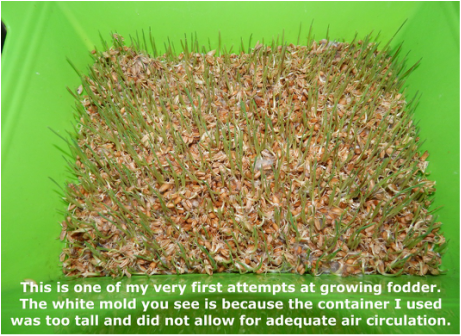Almost a year ago, I wrote about wanting to experiment with fodder for feeding our rabbits and chickens. I really didn't think it would take me this long to write a follow up to that post!
I have learned a lot in the last several months. I have learned that finding a local source for sprouting seeds in bulk is much more difficult than I expected. There are a number of sources available online, but I was not happy with any of the prices and by the time shipping charges are added, the price is even worse! Every feed store around me has whole oats, so that one was easy to find. Finding whole wheat or barley however was next to impossible. I frequently forget that Ramsey's Farm Market is even in Morristown, because they are not on any of the usual routes I take to anywhere else that I go - but when I remembered to check with them, I found that they carry soft red wheat and the price is actually reasonable. Every supplier I contacted told me they did not carry whole barley, so I gave up on that until recently. One of the local TN Farmer's Co-op stores who told me in late spring that they did not carry it, has now started to do so - which means that I will be purchasing my first bag of barley very soon.
I have learned a lot in the last several months. I have learned that finding a local source for sprouting seeds in bulk is much more difficult than I expected. There are a number of sources available online, but I was not happy with any of the prices and by the time shipping charges are added, the price is even worse! Every feed store around me has whole oats, so that one was easy to find. Finding whole wheat or barley however was next to impossible. I frequently forget that Ramsey's Farm Market is even in Morristown, because they are not on any of the usual routes I take to anywhere else that I go - but when I remembered to check with them, I found that they carry soft red wheat and the price is actually reasonable. Every supplier I contacted told me they did not carry whole barley, so I gave up on that until recently. One of the local TN Farmer's Co-op stores who told me in late spring that they did not carry it, has now started to do so - which means that I will be purchasing my first bag of barley very soon.
Soaking the seeds prior to sprouting has a learning curve. Soaking is necessary to initiate the sprouting process, but some seeds like to be soaked longer than others, and the ambient temperature of the room in which they are soaking will affect the length of time that those seeds like to soak. Warmer temperatures will require a shorter soaking time for most seeds, but soaking them too long in those same warm temperatures will cause the seeds to begin to ferment (which means they will not sprout at all!).
Moisture is necessary for successful fodder growth, but stagnant moisture is bad. Seeds that are too warm, and/or do not drain well in the grow tray, will begin to ferment and/or grow mold. If the temperature is too warm, the seeds will sprout but the growth rate will be slow and sometimes they will just shrivel and die. The same is true if the moisture level is too low.
By no means is growing fodder as hard as I am making it sound however. My experimentation was not utter failure - I just had to learn to tweak my methods a bit. I still haven't quite perfected my growing system, but it is functional. My rabbits and chickens love the fodder (the chickens like fermented feed as well, but that is a different post for a different day)! So far I have grown oats, wheat, wild bird seed (a mixture of primarily red and white millet, barley, and BOSS), and I plan to try barley very soon. I have some ideas for making my set up more successful and once I have had time to actually put those ideas into practice and test them, I will share them with you as well.
If you grow fodder, I would love to see your set up. Have you learned any special tricks for success?
Moisture is necessary for successful fodder growth, but stagnant moisture is bad. Seeds that are too warm, and/or do not drain well in the grow tray, will begin to ferment and/or grow mold. If the temperature is too warm, the seeds will sprout but the growth rate will be slow and sometimes they will just shrivel and die. The same is true if the moisture level is too low.
By no means is growing fodder as hard as I am making it sound however. My experimentation was not utter failure - I just had to learn to tweak my methods a bit. I still haven't quite perfected my growing system, but it is functional. My rabbits and chickens love the fodder (the chickens like fermented feed as well, but that is a different post for a different day)! So far I have grown oats, wheat, wild bird seed (a mixture of primarily red and white millet, barley, and BOSS), and I plan to try barley very soon. I have some ideas for making my set up more successful and once I have had time to actually put those ideas into practice and test them, I will share them with you as well.
If you grow fodder, I would love to see your set up. Have you learned any special tricks for success?


